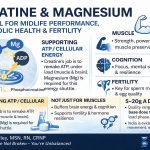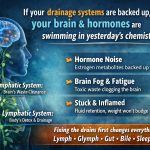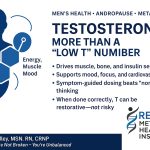Women Aren’t Broken—You’re Unbalanced: Why Antidepressants Aren’t Step One (and How to Actually Get Your Life Back)
Summary: If your body changed and all you got was “your labs are normal” or a quick antidepressant, you were under-served. This guide explains the real drivers—hormones, gut, sleep, and stress—and lays out a practical blueprint to restore balance.
The pattern too many women know by heart
You show up with fatigue, anxiety, brain fog, stubborn weight, low libido, fractured sleep, and “I don’t feel like myself.” You leave with reassurance (“this is normal for your age”) or an antidepressant as step one.
Antidepressants have a place for true clinical depression and crisis care. But for millions of women in perimenopause, menopause, and midlife, the core problem is unbalanced biology—not a serotonin shortage. When care skips the biology, women keep suffering.
You’re not broken—you’re unbalanced. Balance is a system, not a slogan.
Why “normal” labs can still feel terrible
Reference ranges describe averages, not the zone where you thrive. You can sit “in range” and still feel exhausted, anxious, hot, wired at 2–3 a.m., and stuck with midsection weight—because signals (hormones) are only half the story. The terrain (gut lining, bile flow, receptor sensitivity, sleep rhythm, stress chemistry) determines whether those signals land.
The biology behind midlife symptoms
1) Hormone signaling
- Estrogen & progesterone: brain wiring, sleep temperature control, mood stability, joint comfort, metabolism.
- Testosterone: drive, muscle maintenance, insulin sensitivity, body composition.
- Thyroid: metabolic tempo; poor conversion of thyroxine to triiodothyronine mimics depression and fatigue.
- Cortisol rhythm: should rise in the morning and glide down at night; when flat or inverted, you feel “tired and wired.”
2) Gut terrain (the hormone control panel)
The gut’s one-cell lining, bile flow, and microbiome determine whether hormones reach the cell. Irritation and low-grade inflammation blunt hormone receptors, scramble estrogen pathways, and drive cravings, anxiety spikes, and night-time wake-ups.
3) Circadian & sleep architecture
Light timing, temperature cues, caffeine timing, and meal timing set your brain’s clocks and downstream metabolic clocks. When timing drifts, melatonin and cortisol misfire; sleep fragments; appetite chemistry gets loud.
4) Stress and anxiety
Choppy sleep + unstable blood sugar + low estrogen/progesterone produces a nervous system that lives in “yellow alert.” Breath, light, protein timing, and short walks can downshift this loop quickly.
Why antidepressants shouldn’t be step one
- They target mood chemistry, not root signals. Night sweats, 2–3 a.m. wake-ups, low libido, hot flashes, and midsection weight are hormone signals.
- They can mask feedback. If biology remains uncorrected, metabolism, sleep depth, and body composition keep drifting the wrong direction.
- They’re not wrong—just mistimed. Rebalance first; medications work better, or are needed less.
Never stop, start, or change a prescription without your clinician. The point is sequence: fix biology first.
What step one should look like (before meds in most midlife cases)
A. Restore the signals (bioidentical, physiologic—not extreme)
Thoughtful bioidentical hormone replacement therapy (BHRT) for estrogen, progesterone, and—when indicated—testosterone, plus a thyroid plan that considers conversion and symptoms, not just one number.
B. Rebuild rhythm (sleep and appetite chemistry)
- Morning outdoor light within 60–90 minutes of waking
- Evening dimming (lamps at eye level; cool, dark bedroom)
- Protein-forward first meal within 2–3 hours of waking
- 10-minute walks after meals to stabilize glucose and reduce nighttime awakenings
C. Calm the gut so hormones land
Short, focused lining repair, bile flow support, and gradual fiber diversity so cravings, mood, and sleep stabilize.
D. Supply the materials (medical-grade nutraceuticals)
Practitioner-grade formulas (not random gummies) that provide the cofactors hormones need to work—gut lining support, omega-3s, fat-soluble vitamins A/D3/K2, magnesium, thyroid cofactors, and targeted metabolic support.
Shop the medical-grade supplements & peptides referenced in the book: Revitalize Nutrition Store
What changes when you balance (systems affected)
- Mood & anxiety: steadier baseline; fewer “edge-of-tears for no reason” moments.
- Sleep architecture: fewer wake-ups; deeper slow-wave sleep; clearer mornings.
- Metabolism & cravings: improved insulin sensitivity; quieter appetite; visible waist change; better training response.
- Cognition & drive: less brain fog; more focus & motivation; desire that feels like you again.
- Thyroid & energy: warmer hands; regular bowels; steadier daytime energy.
- Gut: calmer digestion; less bloat; better tolerance to protein and fiber.
A practical 14-day “re-balance sprint”
Days 1–3: Calm & anchor
- Pull the obvious irritants (alcohol, ultra-processed snacks, fried foods).
- Start a focused lining repair and bile support stack (medical-grade).
- Morning light, protein-forward first meal, 10-minute walk after lunch and dinner.
Days 4–7: Sleep & rhythm
- Caffeine cut-off ~8 hours before bed.
- Warm shower 90 minutes pre-bed; cool, dark bedroom.
- Lamps after sunset; screens dimmed or reader mode.
Days 8–10: Metabolic momentum
- Strength train 2× (push, pull, hinge, squat, carry; 20–30 minutes).
- Add gradual fiber diversity (one new high-fiber plant per day); keep hydration and electrolytes steady.
Days 11–14: Personalize
- Track sleep, energy, mood, cravings, and digestion.
- If thyroid-like signs persist (cold hands, slow bowels, brain fog), consider cofactors alongside clinician-guided BHRT.
- Reintroduce any paused foods one at a time; watch the next 24 hours for sleep, cravings, bloat, mood.
Expect early wins by nights 2–4 (quieter awakenings), visible momentum by weeks 2–4, and body-composition and mood shifts by months 2–3.
Go deeper with the full framework
My book You’re Not Broken—You’re Unbalanced gives you step-by-step checklists, “good → better → optimal” targets, gut–hormone repair, circadian resets, and the exact conversation to have with your clinician about BHRT and labs that reflect how you actually feel.
- Purchase on Amazon: Buy the Book on Amazon
- All major retailers: Books2Read
- Medical-grade supplements & peptides referenced in the book: Revitalize Nutrition Store
Medical disclaimer: Educational content only; not medical advice. Never start, stop, or change a prescription—including antidepressants—without speaking with your clinician.




